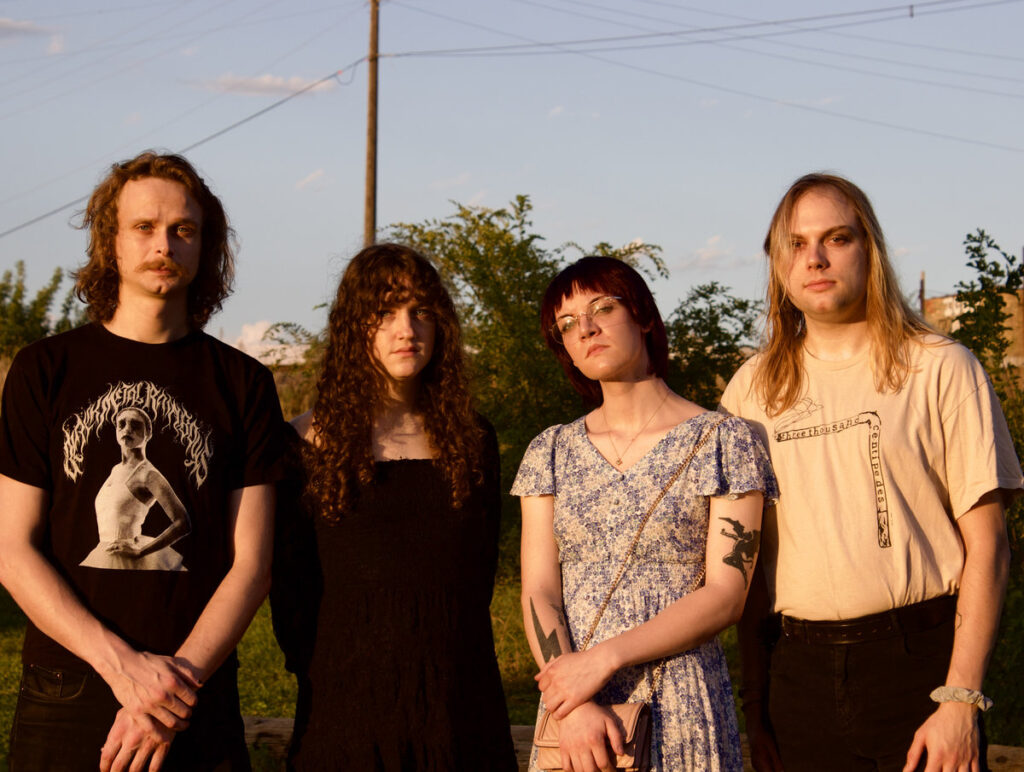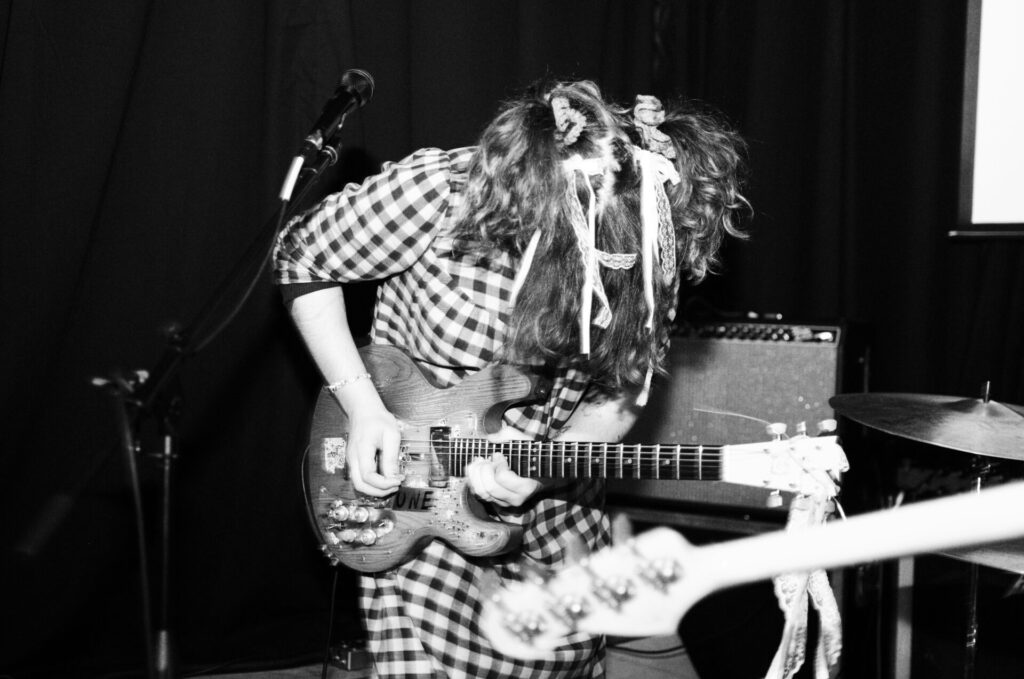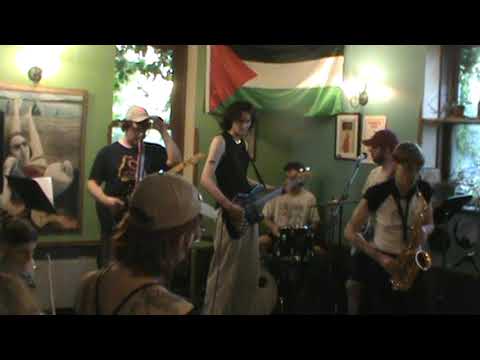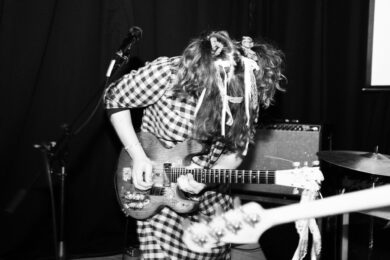“What’s the etiquette for taking off your top here?” a transfemme friend asks me toward the end of a DIY bill at her first night out at Minneapolis’s Seward Cafe.
I look around the courtyard, where at least half a dozen trans women have already foregone their shirts and bared their breasts to combat the sweltering summer heat. I shrug and say, “People do it.”
So goes a standard night out in the underground music scene of the Twin Cities of Minneapolis and Saint Paul, Minnesota. The music is loud and fast and often sloppy; the venues are as unassuming and endearingly ramshackle as the best DIY spaces tend to be. And, if you are anyone who doesn’t fit into the hegemonic social norm — be that queer, trans, or a person of colour — you’re so surrounded by others living on the margins that you can let loose beyond what is capable at most other settings for live music. The unspoken routine of topfreedom among trans women at Seward is just one such example of how comfortable we feel.
When I first moved out to Minneapolis after a life spent in various East Coast states, what many Minnesota residents talked about in anticipation of me getting familiar with the scene were the well-known fixtures — namely, the iconic First Avenue, made legendary by the film Purple Rain, and its various sister venues. Back then, in 2021, DIY spaces were still mostly shuttered, and so the most underground social life was yet to roar back to full power. Then, sometime in 2023, the waters started to shift — the cooperatively-owned Seward Cafe returned to infrequent shows, and the newly-opened skate shop PILLLAR Forum began experimenting with having its coffee shop/bar serve the same double function (before it moved all shows to a side room where — briefly, charmingly — the stage was in the middle of a small half-pipe, which is sorely missed.)
From here, a dam seemed to burst, and now the Twin Cities’ underground scene is its own ecosystem — almost entirely at a remove from what happens at bigger venues in the heart of downtown districts, a living, breathing social fabric that thrives in its own small corner of the region. It’s hard to go a week without at least one bill loaded with queer and trans bands, and even harder to not come across any gig where one of the very same groups is on the lineup as incidental fact-of-matter.
So what makes now such a lively moment for the Twin Cities underground? It can be chalked up to several factors, but perhaps foremost is the fact that there is no singular force in the booking and venue operations. It is, indeed, a communal effort in the cities’ DIY sector, built upon by diligent staffers at PILLLAR, volunteers at Seward Cafe, and passionate tenants who operate venues like the Dollhouse and Como Backdoor out of their own homes to add even more viable spaces for those on the margins.
Bolstering the cooperative feel is the fact that, often, the people who give the scene its musical identity are the same ones who are working to make these spaces operational. In Juno Parsons’ case, it’s running sound and visuals for PILLLAR Forum alongside their vocals and guitar work for screamo outlets Thumper and Pointless Animal. Mirii Landsem supplements her time in emotional black metal quartet Eudaemon and indie pop group I Want To Eat Lava And God Cannot Stop Me with volunteer work at various DIY venues, and runs A Queer Ritual — initially a one-night festival of local and touring queer metal bands, now a year-round booking venture. Xochi de la Luna, a curator and producer throughout the arts scene, is one of the three residents of the Dollhouse and, thereby, one of the three people working to make it a viable gig space.
It’s not just about building a space for music, though; at the heart of the Twin Cities underground is a steadfast mobilisation toward causes that disproportionately affect the attendees’ immediate communities. I’ve previously reported on Doll Brawl, an irregular series of trans-led benefit shows — spearheaded by Nina Medvedeva of punk trio S.L.O.G., E Regardless of the defunct hardcore band Prison Ruin and the darkwave project E.T., and photographer and artist Piggie Lynn — which ran throughout 2024 and raised funds for organisations like the Minneapolis chapter of Autonomous Yurt Union and Southside Foodshare. And while Doll Brawl itself is currently inactive, its organisers’ hopes that people continue in its spirit have kept strong. It’s become routine for shows at Seward Cafe, especially, to still redirect entry fees to causes like these, as a way to provide a tangible form of activism beyond the mere act of gathering and performing.
It seems like more new queer and trans bands form every year, often as a result of budding musicians seeing how vibrant and welcoming the current landscape is. It’s not unusual to overhear talks of what the scene may still need and niches still yet to be filled from those attending these shows.
And then there’s something like the fluid experimental screamo collective Pointless Animal — here, any number of local musicians from groups such as Anita Velveeta, Eudaemon, and Hey, ily! enter and exit its lineup completely freely. The membership is malleable, and you never truly know who exactly you’re seeing on stage in advance of when they play. The thrill is twofold: every configuration feels unique, like an entity that only exists in that ephemeral moment, and so does the music itself, which can hew toward free improvisation the larger the band grows. In true DIY fashion, they and others in the scene have yet to release a single studio recording. So much of the current Twin Cities landscape thrives in the present moment, feeling like a living breathing organism whose essence is most potent in the flesh.
For bands like Eudaemon or the hardcore beatdown outfit Chemsexx, the common trajectory is to cut your teeth and build your sound across volunteer-run venues, before putting out a demo that can then potentially be springboarded into a full-length. In Velveeta’s case, though she’s already a well-established figure in the cities, she’s been playing almost nothing but songs from a still-unreleased album for almost a year, fine-polishing the exacts. In this context, what emerges as official releases are documents of the scene in their own right, a reflection of what those coming to their shows are responding to most.
At present, the genre makeup of the scene leans most prominently toward the heavy and angry. It’s only natural: give queer people, trans people, and people of colour a space to speak to their own frustrations about a social environment intent on grinding them down, and they will redirect that righteous fury into music that mirrors that intensity of feeling. Punk, beatdown, emoviolence, and post metal tend to be the genres that pop up with the greatest frequency, accordingly. “Tranny shitpost hardcore” might as well be a regional subgenre unto itself at this point, given that both S.L.O.G. and I Owe This Land A Body have described themselves along those terms (though, if I may editorialise, both bands carry more than enough fervent sincerity where it counts to be more than just that).
However, as in many scenes, there are also alternatives to the alternatives. The punk shows that used to be the norm for many nights at Seward Cafe are now surrounded by just as many with acoustic singer/songwriters, ambient and drone musicians, folk punk artists, and bills that are just plain grab bags of as many local acts a night can feasibly fit. (One such recent lineup featured solely musicians paying tribute to Jim O’Rourke; another, a scattershot array of talent to help fundraise a new sound system as the venue looks to further prioritise live music.) And then there’s the assortment of dance nights and electronic sets at Latin restaurant Conga Lounge, the social club Eagles #34, and secret warehouse spaces that seem to multiply every year.
But if there’s any immediately pressing opposition to everything the Twin Cities have come to stand for in recent years, it’s, predictably, that which threatens many DIY spaces in any city. A rash of landlord disputes and eviction warnings have shaken the stability of the DIY houses Pink Place and Como Backdoor in the past month alone, with the latter forced to cancel their shows altogether and vacate the premises. The fact that both these incidents occurred with house venues in the same neighborhood feels like more than mere coincidence, closer to panicked landlord clampdowns on the scene. It remains to be seen how much this may prove to be an ongoing issue beyond the Como neighborhood, and what may be done to mitigate it, though the overwhelming public petition in Pink Place’s favour and the venue’s victory in its tenants’ pushback hopefully spells promise for the longevity of other house venues like the Dollhouse.
The self-bolstering nature of the queer and trans DIY scene here has been one of the most pleasant surprises for me since moving to Minneapolis. I had expected that something like this would be more prominent in other Midwest cities such as Chicago, where greater populations would inevitably lead to more active scenes. In talking with other transplants, we’ve begun constructing some theories for why this is. The relative geographic smallness of Minneapolis and Saint Paul make them much easier to quickly get around than more sprawling, densely packed greater metropolitan areas, each city’s population a few hundred thousand in comparison to the millions of, say, Chicago. What results is a smaller overall population of trans people often funnelled into the same handful of options for live music by people like them. The intimacy of the whole affair breeds a tight-knit environment unlike what a larger city could possibly provide. If you’re trans and go out to shows often enough in the Twin Cities, you’re bound to see many of the same faces with near-certainty.

But there’s also a more practical answer: Minnesota’s presence as one of the few committed trans refuge states in the United States, during an especially fraught political moment of endangered rights and violent scrutiny. The longer I spend in these cities, the more I encounter trans women who came here explicitly to flee states more dangerous for anyone openly out. Here, they knew they could have gender-affirming resources and clinics at the ready. Here, the risk of the state stripping away healthcare access would be much lower. Here, they could stand a better chance of finding community with those like them, seeing how many before them had already built these spaces up, paved the way for their arrival. The more the scene as it stands exists, the more it represents this promise to the next wave of trans music lovers simply looking for a safe place to live and likeminded people to congregate with.
More than any other virtue of the Twin Cities music scene, it’s this uninhibited sense of freedom and belonging that renders this pocket of the Midwest truly remarkable at this present moment. A common refrain I hear from trans friends I take out to their first DIY shows here is just how vast the span of people like us there are out here, how many of us there are in spitting distance and looking for the same connections, how readily we’re around to be there when one of us needs others to fall back on. Our love for one another here takes many forms: it’s showing up for each other’s sets. It’s adoringly showing vicious affection in the pit. And it’s using our shared affinity for the music we create to help each other out in times of greatest need.
Below, read on about five noteworthy releases from the past six months of the Minneapolis and Saint Paul underground.
EudaemonSpiritual AnguishRiff Merchant
For my money, the most substantial release to emerge from the Twin Cities so far in 2025. This emotional black metal quartet has been a mainstay in the local heavy music scene for a few years now, but the clarity of Spiritual Anguish’s arc in miniature of changing bodies, dissonance between past and present selves, and metaphysical surrenders to the earth results in one of the most ambitious and poignant records to come out of Minneapolis lately. Eudaemon wields both sides of their self-affixed label with utmost intensity, as on the tilting axes of agony and frenzy on opener ‘Karst’, where the song’s playing with tempo is synonymous with a fluidity in forcefulness. But it’s the record’s embrace of emo and shoegaze influences on tracks like ‘Empty Hallways’ and ‘In Mirrors’ that gives it a stirring potency, the moments where Mirii Landsem’s harsh screams give way to morose cries, cutting through the more brutal passages to emerge in a place of melancholic beauty. For a trans listener like me, it’s as rich and powerful as any metal record to emerge from the city since I moved here, offering a vivid rendering of what it means to transform oneself and their relationship to the forces around them.
BejalvinBejubstep 3Create
It’s impossible to pin down this anarchic duo’s stylings to a single genre without failing to account for something completely different. Are they just post-hyperpop? What, then, is to be made of something like ‘Speed Up, where the track is subsumed by a power noise wind tunnel? What about all the deathcore breakdowns? Maybe it’s just in the record title, and it’s post-post-irony brostep and riddim? But then you hit the piano jazz break at the end of ‘Pass Out’, or the avant-free-tronica of ‘Touch Grass’ that gestures at Captain Beefheart with access to wimpy vaporwave synths, and whatever preconceived notions that title implied go out the window entirely.
Bejalvin embody the freest parts of the Minneapolis scene, positing that electronic music be more assertive about itself, that heavy music lighten up every now and again. Their roots are firmly in cybergrind forebears in the scene like Blind Equation, but more overtly postmodern, irreverent, and unafraid to be weirder and downright alienating. Not every hairpin turn on Bejubstep 3 works, and the cruder joke drops can distract from the most bizarre bits of inspiration. But it’s attention-grabbing unlike anything else in the cities at the moment, and refreshing in a scene mostly dominated by punk and metal.
Purity OlympicsImpossible February In D MinorHypnagogic Honey
I have a pet fascination for ambience whose intensity can be mistaken for noise, and noise whose tranquility and languid pace can be mistaken for ambience. This project, helmed by fellow Minneapolis music writer Aly Eleanor, cuts to the core of that thin line, manipulating loops, decay, samples, and spoken word passages to captivatingly icy effect. The palpable melancholy of the record only grows stronger, and more affecting, the further it continues – take, for instance, the pitch-shifted poem ‘Spring Rain’ that startlingly flips into a harsh noise button, followed then by the sombre centrepiece ‘Please Don’t Record A Vision’, whose howling drones linger as if listening to a blizzard while laying face-down in a snowbank. I especially adore the title track, which stutters in pronounced reverberation like a more minimalist SHXCXCHCXSH cut being slowly eaten in a tape deck. It’s a release that truly captures the ways a Minnesota winter gradually seeps into its residents’ bones – the enveloping blankets of frost, the unshakable chill, the seeming interminability of it all. But also, in its inconspicuous inclusion of several key players around the Twin Cities, it mirrors how the cooperative forces of the scene hold one another tight through the harshest conditions.
KillusonlineWhat You Get Away WithSelf-Released
I first discovered Killusonline as the local opener on a bill of touring hardcore bands, but their music is a bit more slippery that slot implies. The grooves and skronks their instrumentalists operate feel far closer to that of nu-metal revival, and vocalist Mory’s alt-rap flow mostly keeps at a register of relative restraint. The group’s debut record is as focused a shrapnel blast you could ask for from a band that’s been honing their sound for years; in Max Folina’s almost-mathy command of panic chords and pinch harmonics on tracks like ‘Runner’s High’, there’s a tightly wound technicality unlike what a lot of the faster and looser punks in the Twin Cities go for. It’s that push and pull, the multifaceted essence of Killusonline’s very being, that makes them so versatile in the scene, able to command whatever bill they’re placed within with preternatural ease.
I Owe This Land A BodyCowards That BeControlled Opposition / ALA
Ideally, the best hardcore should feel like getting punched so hard and so swiftly that you barely have time to register what even happened until you’re picking yourself and your teeth up off the floor. This is, incidentally, what many of the most impassioned pits I’ve witnessed in the Minneapolis trans punk scene have been like, of which the powerviolence of quintet I Owe This Land A Body has been responsible for more than a few. The protracted buildups and dizzyingly brief onslaughts of Cowards That Be alternate with enough tension to keep you on your toes, though my personal favorite here, ‘Cease to Exist,’ works wonders as a straightforward firebomb of alternating time signatures. There are no shortage of trans hardcore bands that could easily occupy this slot, but I Owe This Land A Body’s unapologetic viciousness and dual-vocalist-interplay sells their urgency against oppression with especially visceral heft. You won’t know what hit you until the feedback has already been cut short.





